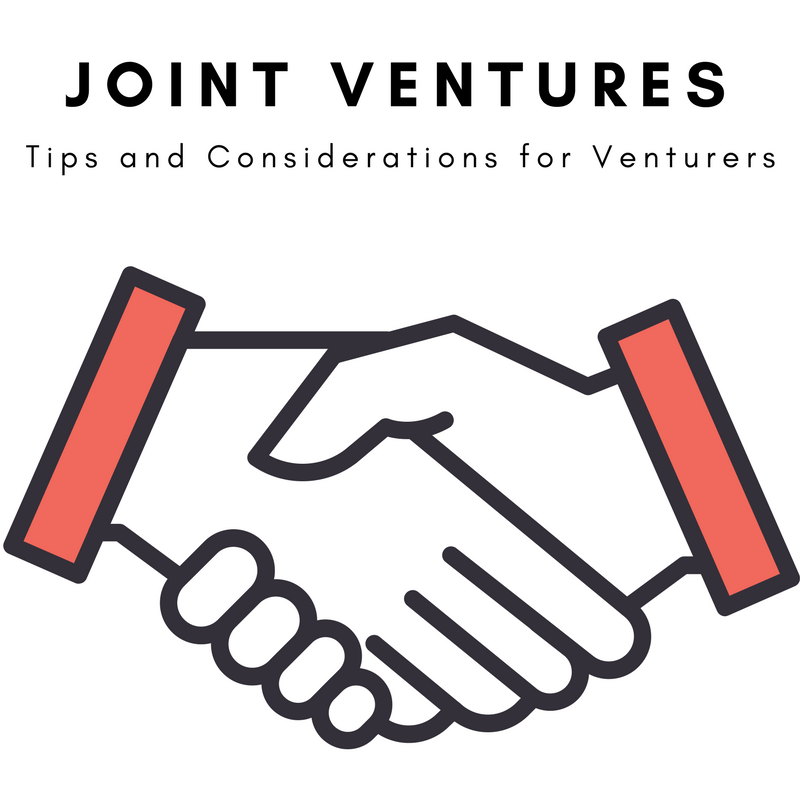|
Oftentimes, startups or small businesses have a business idea and want to work with another company to promote and sell it. In those circumstances, they may want to consider a joint venture.
But what exactly is a joint venture? Investopedia offers a sucinct definition here: “A joint venture (JV) is a business arrangement in which two or more parties agree to pool their resources for the purpose of accomplishing a specific task. This task can be a new project or any other business activity. In a joint venture (JV), each of the participants is responsible for profits, losses and costs associated with it. However, the venture is its own entity, separate and apart from the participants' other business interests.”1 In forming a JV, there are nine preliminary considerations that entrepreneurs face: First, the parties may wish to consider entering into a confidentiality agreement or non-disclosure agreement to enable them to share information with each other freely and as necessary to plan the JV terms before entering into the JV. Second, parties may want to solidify their preliminary understanding of agreed terms and streamline the subsequent drafting process for the definitive JV agreement by entering into a term sheet or letter of intent. Third, each party to the JV will want to conduct due diligence on the other party/parties to the JV to confirm expectations and understandings, and to independently verify the abilities of the other(s) to fulfill the conditions and requirements of the JV agreement. Fourth, parties may wish to retain counsel to determine whether the JV will be subject to antitrust review under the Hart-Scott-Rodino Antitrust Improvements Act of 1976 (the “HSR”). The HSR provides that certain proposed transactions are subject to notification and waiting requirements prior to consummation. This allows the Department of Justice and Federal Trade Commission to determine whether they oppose the transaction on antitrust concerns. The HSR provides for both size-of-the-transaction and size-of-person tests to determine whether a transaction is reportable. If subject to review and reporting, the parties may wish to engage counsel, who will then prepare and submit required filings. Fifth, parties may want to discuss exactly how they wish to form the JV. A JV may be accomplished through contractual relationships among the parties, or by the formation of a new entity. JVs typically fall into one of four categories; (i) contractual JVs, or JVs accomplished by a contract; (ii) partnerships; (iii) corporate JVs; or (iv) limited liability companies ("LLCs"). The nature of the joint venture’s business, the potential liability exposure to each party to the JV, and tax considerations may influence which entity structure is best. Sixth, the joint venture parties and their counsel should consider the choice of law and jurisdiction/dispute resolution terms to which the JV will be subject, evaluating the comparative legal and tax requirements across possible jurisdictions where applicable. Seventh, depending on the type of entity chosen, the parties must negotiate and execute either the JV contract, the stockholders’ agreement (for corporations), partnership agreement (for partnerships), or operating agreement (for LLCs). This will set forth the venturers’ respective rights and obligations under the JV. Eight, depending on the type of business contemplated by the JV, parties should discuss with counsel whether other types of contracts, such as services agreements, indemnification agreements, and employment agreements, may be necessary. Finally and relatedly, the parties may contribute assets to the joint venture. Assets can be capital or real estate, for example. If the parties are transferring non-monetary assets to the joint venture, the parties should discuss how this will be accomplished. Depending on the method and manner of accomplishing the transfer, a contribution agreement, license agreement, or lease agreement may be necessary. Smith Shapourian Mignano PC is available to answer any questions or concerns you may have regarding JVs. This blog does not constitute solicitation or provision of legal advice, and does not establish an attorney-client relationship. This blog should not be used as a substitute for obtaining legal advice from an attorney licensed or authorized to practice in your jurisdiction. You should always consult a suitably qualified attorney regarding any specific legal problem or matter in a timely manner, as statutes of limitations may bar your claim. 1. See https://www.investopedia.com/terms/j/jointventure.asp#ixzz59gENDoxf
Edwin Castro
2/26/2023 10:50:44 am
"As much as I am shocked and ecstatic to have won the Powerball drawing, the real winner is the California public school system". No one would convince me that winning this lottery Powerball or mega millions is not something that changes the way and view of life's prospects. My name is Edwin Castro and I am from California, United States. I won the Powerball Lottery on Nov 7 2022 and I am coming to say a wonderful and big thanks to Dr Anokokudo for helping me with the winning numbers for the Powerball Lottery. I was really overwhelmed the day I contacted Dr Anokokudo to help me win the California Powerball Lottery when he instructed me what to do. The time came to play the lottery and I did and believe me, it was exhilarating. I won the Powerball $2.04 Billion and collected the lump sum of $997.6 Million and the November Powerball drawing raised a record $156.3 million for the California public school system. I am indeed thankful to Dr Anokokudo and others who helped me with his contact. Anyone who reads my comments should also try to contact Dr Anokokudo at [email protected] 6/20/2023 10:47:11 pm
Awesome Blog! Your blog is very informative for everyone. Ahlawat & Associates are top-notch legal professionals, providing excellent legal services with utmost professionalism and expertise. Highly recommended! Comments are closed.
|
Archives
February 2023
Categories
All
|
© 2023 SSM Law PC. All Rights Reserved.
Privacy Policy
Terms of Use
Accessibility Statement
Attorney Advertising
Client Reviews & Testimonials

 RSS Feed
RSS Feed